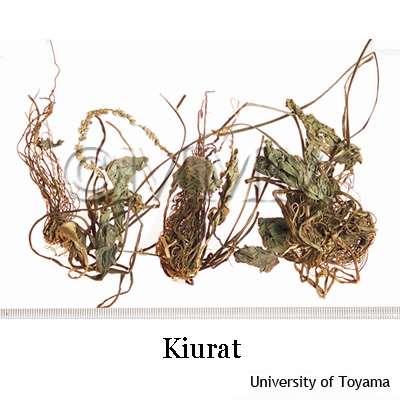Crude drug sample data base
※Click on the image to enlarge it.
Scientific information data base
| Crude drug name | Indonesian name, English name | Daun sendok, Great plantain, Waybread, Nipple grass | ||
|---|---|---|---|---|
| crude drug image |
| |||
| Original plant name | Plantago major Linn. | |||
| Family name | Plantaginaceae | |||
| Used part | Whole plant | |||
| Distribution area | In Java (Indonesia) it occurs from low land up to 3300 m altitude. It grows in sunny or shady places. During dry season, it grows on a rather wet soil, mostly on grass field, casuarine forest, open places in the thickets. It grows as a weed in the garden and plantation. It is often cultivated for its beneficial effects on health [201]. | |||
| Description | The plant is a small perennial herb up to 30(-70) cm tall, with numerous fibrous and whitish roots; leaves in one or a few rosettes, ovate to elliptical, entire or irregularly dentate; spike 5-20(-35) cm long, densely to rather laxly flowered; fruit 2-4 mm long, (4-)6-34-seeded; seeds ellipsoidal or ellipsoidal-trigonous, dark brown to dull black [205]. | |||
| Drug effect | Sweet, cooling, blood cleanser [231]. | |||
| Specific actions | Anti-inflammatory, diuretic, antipyretic, expectorant [231]. | |||
| Frequency in use | Moderate. | |||
| Pharmacological effect | Aqueous extract of the aerial parts (leaves and seeds) of Plantago major inhibited Bacillus subtilis , hexane extract inhibited the growth of Escherichia coli, and methanol and chloroform extracts weakly inhibited the growth of Bacillus subtilis and Escherichia coli, respectively. Methanol extract decreased the UISO and OVCAR cell concentrations. Data demonstrate for the first time that Plantago major has hematopoietic activity in vitro [PMID:16226858]. Pure compounds of Plantago major, which possess antiviral activities are mainly derived from the phenolic compounds, especially caffeic acid. Its mode of action against HSV-2 and ADV-3 was found to be at multiplication stages (post infection of HSV-1: 0-12 h; ADV-3: 0-2 h), and with SI values greater than 400, suggesting the potential use of this compound for treatment of the infection by these two viruses [PMID:12076751]. | |||
| Medical system | Indonesian medicine (Jamu) | |||
| Traditional usage | An extract of the whole plant is used as diuretic in cases of renal calculi, often in a mixture with 5 parts of Clerodendrum, and also to treat diabetes and skin diseases. Leaves are used to treat cough, wounds and pimples [201]. | |||
| Formulation | 1) Diuretic: 15 grams of leaves and 3 grams leaves of Strobilanthes crispa are boiled with water to make an infusion [201]. 2) Parasites: An infusion of the plant mixed with fennel fruits and bark of Alyxia reinwardtii is an anthelmintic [201]. 3) Haemorrhoids/hemorrhoids: Leaves together with leaves of Graptophyllum pictum are mixed to make an infusion. It cures haemorrhoid/hemorrhoid if used regularly [201]. 4) Wounds: Roasted leaves are applied on the wounds [201]. 5) Rheumatism: Fresh aboveground parts of P. major are pounded to make a paste, rub the paste on the affected areas [231]. 6) Kidney stones: 7 grams of aboveground parts of P. major, 7 grams of root of Imperata cylindrica, 2 grams of leaves of Strobilanthes crispa, 6 grams of fresh aboveground parts of Orthosiphon stamineus, 2 grams of aboveground parts of Phyllanthus niruri are boiled in 130 ml of water to make a decoction. Drink 100 ml of the decoction once a day for 14 days. The mixture can also be pounded, squeezed and strained to obtain juice. Drink 1/4 cup of the juice once a day for 14 days [231]. | |||
| References | Reference book Tips! | [205] de Pdua, L.S., Bunyapraphatsara, N. and Lemmens, R.H.M.J. (Editors), 1990. Plant Resources of South-East Asia No. 12 (1). Medicinal and poisonous plants 1. Backhuys Publishers, Leiden, Netherlands. pp 397-400, 402. [207] Badan Penelitian Dan Pengembangan Kesehatan and Departemen Kesehatan, Kesejahteraan Sosial Ri. Vols. 1-5, Inventaris Tanaman Obat Indonesia, Jakarta, Indonesia. Vol. 1, Part 1 (2000), pp 185-186. [222] P.T. Eisai Indonesia: Medical Herb Index in Indonesia (Second edition).1995. p 229. [231] Soedibyo, Mooryati: Alam Sumber Kesehatan: Manfaat dan Kegunaan (Natural resources for health. Benefits and uses). Balai Pustaka. 1998. pp 128-129. | ||
| Research paper | 1. Chiang LC, Chiang W, Chang MY, Ng LT, Lin CC. Antiviral activity of Plantago major extracts and related compounds in vitro. Antiviral Res. 255(1):53-62, 2002. (PMID: 16226858) 2. Velasco-Lezama R, Tapia-Aguilar R, Roman-Ramos R, Vega-Avila E, Perez-Gutiere MS. Effect of Plantago major on cell proliferation in vitro. Antiviral Res. 55(1):53-62, 2002. (PMID: 12076751) | |||
| Remarks | [DNA sequences] AB296071, AB281165 | |||
| Last renewal date | 2024/03/04 | |||


